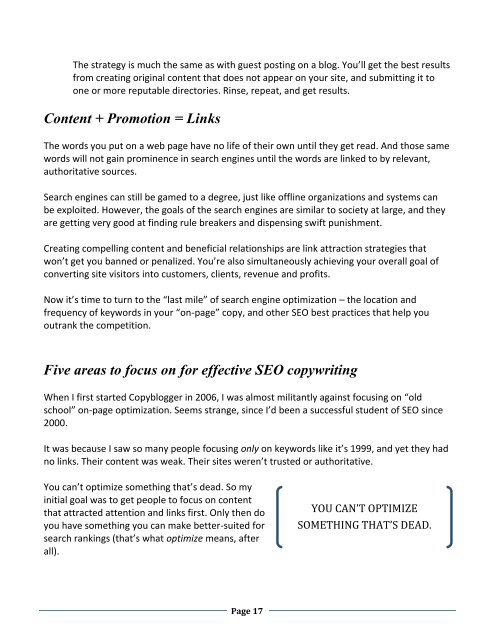How to Create Compelling Content
How to Create Compelling Content That Ranks Well in Search Engines This free 27-page report by Copyblogger founder Brian Clark provides you a step-by-step strategy for creating content that scores links, is highly readable and engaging, and ranks well in
How to Create Compelling Content That Ranks Well in Search Engines This free 27-page report by Copyblogger founder Brian Clark provides you a step-by-step strategy for creating content that scores links, is highly readable and engaging, and ranks well in
You also want an ePaper? Increase the reach of your titles
YUMPU automatically turns print PDFs into web optimized ePapers that Google loves.
The strategy is much the same as with guest posting on a blog. You’ll get the best results<br />
from creating original content that does not appear on your site, and submitting it <strong>to</strong><br />
one or more reputable direc<strong>to</strong>ries. Rinse, repeat, and get results.<br />
<strong>Content</strong> + Promotion = Links<br />
The words you put on a web page have no life of their own until they get read. And those same<br />
words will not gain prominence in search engines until the words are linked <strong>to</strong> by relevant,<br />
authoritative sources.<br />
Search engines can still be gamed <strong>to</strong> a degree, just like offline organizations and systems can<br />
be exploited. <strong>How</strong>ever, the goals of the search engines are similar <strong>to</strong> society at large, and they<br />
are getting very good at finding rule breakers and dispensing swift punishment.<br />
Creating compelling content and beneficial relationships are link attraction strategies that<br />
won’t get you banned or penalized. You’re also simultaneously achieving your overall goal of<br />
converting site visi<strong>to</strong>rs in<strong>to</strong> cus<strong>to</strong>mers, clients, revenue and profits.<br />
Now it’s time <strong>to</strong> turn <strong>to</strong> the “last mile” of search engine optimization – the location and<br />
frequency of keywords in your “on-page” copy, and other SEO best practices that help you<br />
outrank the competition.<br />
Five areas <strong>to</strong> focus on for effective SEO copywriting<br />
When I first started Copyblogger in 2006, I was almost militantly against focusing on “old<br />
school” on-page optimization. Seems strange, since I’d been a successful student of SEO since<br />
2000.<br />
It was because I saw so many people focusing only on keywords like it’s 1999, and yet they had<br />
no links. Their content was weak. Their sites weren’t trusted or authoritative.<br />
You can’t optimize something that’s dead. So my<br />
initial goal was <strong>to</strong> get people <strong>to</strong> focus on content<br />
that attracted attention and links first. Only then do<br />
you have something you can make better-suited for<br />
search rankings (that’s what optimize means, after<br />
all).<br />
Page 17<br />
YOU CAN’T OPTIMIZE<br />
SOMETHING THAT’S DEAD.

















